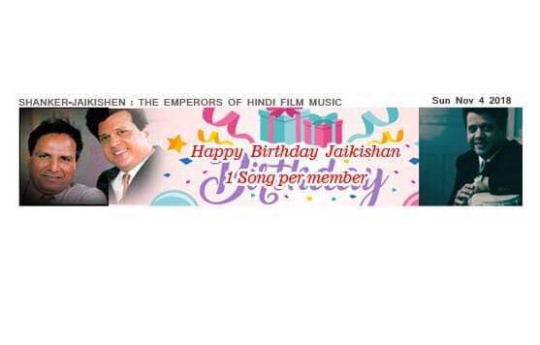#Rajo Korti
Text
Happy birthday to Jaikishan Dahyabhai Panchal of the famous Shankar Jaikishan duo

This feature is by

Mumbai :
Hanste gaate yahaan se guzar
Duniya ki tu parvah na kar
Muskurate hue din bitaana
Yahaan kal kya ho kisne jaana
If you thought the Kishore song fit like “T” on a carefree Rajesh Khanna in the 1971 hit Andaaz, you are doing injustice to the handsome Prince Charming who not only conceived it but also carried off this philosophy on his ebullient shoulders with the grace that was uniquely his own.Jaikishan, of the famous composer duo Shankar-Jaikishan, who set the catchy Andaaz tune, was the Prince Charming of the Hindi film music, both in looks and the royal compositions that he dished out with unfailing regularity to regale millions of cine fans.Born as Jaikishan Dahyabhai Panchal in a family with a humble background in Valsad, a quiet Gujarat town, he died an untimely death at 42. But in the short span of life that he lived, he packed enough musical punch in those songs to hook an entire generation of music lovers. A statue erected in his memory near his home town is just one small testimony to the phenomenal equation he enjoyed with the masses.Andaaz set Rajesh Khanna speeding on the popularity highway even as Shammi Kapoor’s days as hero were nearing the end. By a natural corollary, Kishore Kumar too had taken off at the expense of our most durable Mohammed Rafi.Barely seven years before Jaikishan, as always, eminently in tune and sync with senior partner Shankar (Singh Raghuvanshi), was working on Raj Kapoor’s Magnum Opus Sangam. Shankar himself had danced his fingers on the piano to bolster Mukesh -- RK’s established voice -- to produce a gem in “Dost dost na rahaa”.Always equal to the task, Jaikishan employed the 100-piece orchestra with a stunning prelude for Rafi’s “Ye mera prem patra padhkar” to go on with Rajendra Kumar. Rafi turned out to be more than match to Mukesh, and by the same corollary, Raj Kapoor, who had started bloating then, was edged past by Kumar. Andaaz and Sangam were telling examples of how fickle commercial success could be while good music could stand the test of time.Few know that while working as a team, S-J usually composed their songs separately. Shankar would usually arrange the orchestra, even for Jaikishan's songs. There was a gentleman's agreement between them for not identifying the actual composer of the song.This often triggered a popular pastime for S-J admirers to try to tell a Shankar song from a Jaikishan song. But where Jaikishan left his imprint was in composing background score, a genre that still doesn’t have a peer. Mera Naam Joker and Sangam are considered as benchmarks even today for their background score.It is said that Jaikishan would count some numbers on his fingers before coming up with the background score for a particular scene on the spot! Such was his genius. The beneficiary of this tandem was the RK camp that drew from their bank right from 1948 days of Barsaat to the mid-seventies of Sanyasi when Shankar had become sort of rudderless after the death of his illustrious partner in 1971.Though Jaikishan used to work majorly on background scores of SJ movies, it may be an over-simplification to presume that whatever went in background scores was solely Jaikishan's creation.Since SJ had a common pool of tunes in their stock, made by either of them or by both of them jointly during their numerous music sessions/sittings, it would have been perfectly legitimate and natural for Jaikishan to have used tunes created by either or both partners wherever needed.It is understood that in RK films, Shankar and Jaikishan both used to work on the background scores. On the other hand, both Shankar and Jaikishan were equally proficient in scoring western music based songs.Despite their distinct working styles and preferences, it is very difficult, if not altogether impossible, to ascribe most of their songs to only one of them. In most of the songs, they invariably contributed to one another's creation, either in the form of improvisation of tune or of orchestration, thus, making their compositions truly a joint effort. Furthermore, each of the two could compose in other's style now and then thereby making the identification still more difficult.Either dressed in white trousers and white shirt or a black suit, Jaikishan, who could leave fellow musicians hypnotised with his skills on harmonium and accordion, was quite a character outside the recording room.His handsome looks and airy swagger often got to people, but deep within throbbed a kind and gentle heart that drowned all its triumphs and sorrows in alcohol. Recall his little cameo in Shree 420 as Nadira’s drunkard husband and the way he hugs Shankar and Raj Kapoor during the “Mud mud ke na dekh” song. It showed how RK and S-J were born to keep an entire generation spellbound.
I recall how as an unabashed fan I would stand outside Churchgate’s (Mumbai) Hotel Gaylord to catch his debonair frame. This was where he would meet friends, conceive tunes and hang out. He was a big draw not only for his looks but for his kind ways. In my two freewheeling sessions with him, he spoke honestly about himself, his music, the RK banner and his times.Never once did he spoke in terms of “I”. It was always Shankar-Jaikishan. “Jism do sahi magar, dilo mein faasla nahi,” he told me about his pairing. The only time I detected a faint disillusionment was when he referred to the phase when an affected Shankar had started using the vocals of a lady singer more out of personal than professional discretion.Unlike the musicians of today, Jaikishan was highly appreciative of his contemporaries. He never tired of going gaga over Burman’s “Jaane kya tune kahi”. More often than not, he would brush the discussion on S-J songs aside and compare every song with often the Pyaasa classic.“Look at the rhythm, look at the languid pace of the song and the way it has been sung,” Jaikishan would gush.He was generous to a fault. It was a common sight to watch Jaikishan fish his hands in his pockets and give whatever money he could to beggars, needy musicians and waiters. Stories did round of how out of the way he went to help people without even doubting their credentials. Little wonder, his popularity would turn even heroes green with envy.If anybody finds that an exaggeration, one just needs to visit Hotel Gaylord where a corner table still says “Reserved for Jaikishan”!RK/KR📷
Raju Korti (The author is a Mumbai-based senior journalist and a passionate music-lover and cine-buff. In this column, he draws upon his own numerous personal encounters with great composers, musicians and lyricists who strode the Hindi film music's golden era (1950s & 1960s), and provides the readers with fascinating vignettes.)
#Jaikishan Dahyabhai Panchal#Rajo Korti#Shankar Jaikishan#Shanker Jaikishan#Gaylord#birthday#lata#shankar#jaikishan#shankar singh raghuvanshi
0 notes
Text
Szörpike
Péntek délután este-öt. Odakint elektromos rollerek búgása veri fel az álmos ferencvárosi utcámat. Várom Karéjt, hogy hazaérjen, és keverhessek két fröccsöt. Megkoronázva a hét végét, és köszöntve a hétvégét. Amíg nem jön, gondoltam legalább egy jó bodza szörpöt kikeverek a fertődiből, amit a Rajos szikvízüzemből hoztam négy palack szódával egyetemben és mély egyetértésben a meleg futózápor takarásában. Kimegyek, a hűtőből kiveszem az üveget, csak finoman az aljára, hogy a 120%os cukorszirup ne ragassza össze a beleimet a következő fél órára. Szóda kézbe, első spricc mosogatóba, majd óvatosan körbe-karikába felengedem a habzó poharamat peremig. Két nagy korty a győzelemre. HÁT NEM MUSCAT OTTONEL FRÖCCS LETT BELŐLE VÉLETLENÜL? Freud bácsi biztos jót mulatna ezen.
3 notes
·
View notes